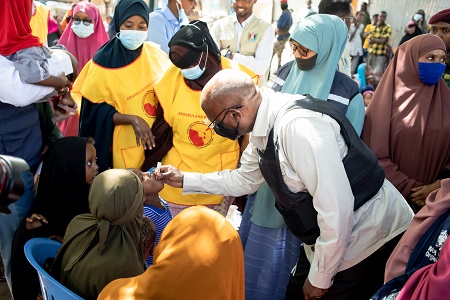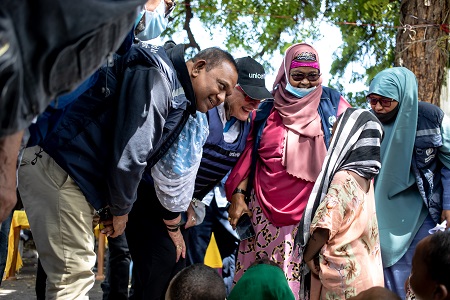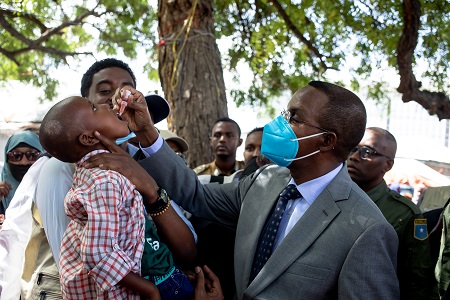 7 June 2022 – On 6 June 2022, the WHO Representative in Somalia Dr Mamunur Rahman Malik was joined by the UNICEF Country Representative Ms Angela Kearney, the Governor and Mayor of Mogadishu HE Omar Mohamed Mohamud Flish and Deputy Special Representative of the Secretary General and the United Nations Resident and Humanitarian Coordinator for Somalia Mr Adam Abdelmoula to officially launch the national immunization day for polio in Somalia. They visited a camp for internally displaced persons in Manahijta and Waberi health centre in Banadir city, to officially launch the national immunization day and vaccinate children against polio.
7 June 2022 – On 6 June 2022, the WHO Representative in Somalia Dr Mamunur Rahman Malik was joined by the UNICEF Country Representative Ms Angela Kearney, the Governor and Mayor of Mogadishu HE Omar Mohamed Mohamud Flish and Deputy Special Representative of the Secretary General and the United Nations Resident and Humanitarian Coordinator for Somalia Mr Adam Abdelmoula to officially launch the national immunization day for polio in Somalia. They visited a camp for internally displaced persons in Manahijta and Waberi health centre in Banadir city, to officially launch the national immunization day and vaccinate children against polio.
The ongoing immunization campaign for polio is targeting close to 3.5 million children under 5 in the country, except Puntland and Somaliland. The first round of the campaign against polio was held in March and close to 95% of the 3.5 million children under 5 received an oral polio vaccine during the first round.
Somalia has remained free from circulation of wild polio virus since 2015. However, the country was affected by another type of polio virus called circulating vaccine-derived polio virus type 2 (cVDPV2) that has continued to circulate in Somalia since 2017 causing paralysis and disability to a number of children in the country.
“The outbreak of polio caused by vaccine-derived type 2 and type 3 virus has led to permanent paralysis and disability to 32 children so far. This means that these children cannot run, walk or play as they should be able to. It also means that 26 families have been going through immense suffering – both socially and financially. Ending polio in Somalia and the rest of the world is a moral imperative for us. We aim for every child being born today to lead a healthy life and have equal access to health services. In this interconnected and globalized world, the threat of polio in one country is a threat everywhere,” said Mr Adam Abdelmoula, Deputy Special Representative of the Secretary General and the United Nations Resident and Humanitarian Coordinator for Somalia, after vaccinating the children against polio and formally opening the national immunization day for polio.
 The vaccine-derived poliovirus circulates in a setting where the routine immunization of childhood vaccination for polio is low and as a result the immunity of children against polio remains low. The transmission of this new type of polio virus is entrenched in the central and southern parts of Somalia, with spillover resulting in cross- border transmission in northern Somalia, Kenya and Ethiopia.
The vaccine-derived poliovirus circulates in a setting where the routine immunization of childhood vaccination for polio is low and as a result the immunity of children against polio remains low. The transmission of this new type of polio virus is entrenched in the central and southern parts of Somalia, with spillover resulting in cross- border transmission in northern Somalia, Kenya and Ethiopia.
Inaccessibility is also a significant constraint to reaching every child in the country. There are some other compounding factors like regular population movement within and between the inaccessible areas and refugee camps in Somalia and neighbouring countries (mainly Kenya) that are pushing back progress.
“The main problem in not being able to stop the circulation of this type of polio virus in the country is the inability of the fragile health sector to reach and vaccinate all children, especially the “zero-dose” children who have never been vaccinated and have no immunization shield to protect them. These national immunization days provide an opportunity to look for every last child and vaccinate them with an oral polio drop. We are hopeful that the country will be able to defeat this virus and the debilitating disease it causes by working together and making sure we use speed and precision to vaccinate all children targeted for such campaigns against polio and measles, said Dr Sk Md Mamunur Rahman Malik, WHO Representative in Somalia.
 WHO and UNICEF are supporting the Government to organize these national immunization days as an accelerated way and means of reaching and vaccinating every last child against polio. All districts in the south and central parts of Somalia, except Somaliland and Puntland, are being covered by the second round of national immunization days using monovalent oral polio vaccine type 2 (mOPV2) from 5 to 8 June 2022 as a part of interrupting cVDPV2 and stopping the outbreak. After much groundwork, including microplanning, team training and logistic preparation, more than 20 664 polio vaccinators with registers traversing the country on foot, and by car, camel and donkey, knocking on doors and working tirelessly to reach as many children as possible during the campaign. More than 4090 supervisors from the Ministry of Health, WHO, UNICEF will be monitoring the quality of the campaigns while 10 333 social mobilizers, together with 146 regional and district social mobilization coordinators, will be visiting house to house to explain the immense benefits for children when they receive the polio vaccine and encourage parents to bring their children to a nearby health centre to vaccinate against polio if they are not reached by vaccinators moving house to house.
WHO and UNICEF are supporting the Government to organize these national immunization days as an accelerated way and means of reaching and vaccinating every last child against polio. All districts in the south and central parts of Somalia, except Somaliland and Puntland, are being covered by the second round of national immunization days using monovalent oral polio vaccine type 2 (mOPV2) from 5 to 8 June 2022 as a part of interrupting cVDPV2 and stopping the outbreak. After much groundwork, including microplanning, team training and logistic preparation, more than 20 664 polio vaccinators with registers traversing the country on foot, and by car, camel and donkey, knocking on doors and working tirelessly to reach as many children as possible during the campaign. More than 4090 supervisors from the Ministry of Health, WHO, UNICEF will be monitoring the quality of the campaigns while 10 333 social mobilizers, together with 146 regional and district social mobilization coordinators, will be visiting house to house to explain the immense benefits for children when they receive the polio vaccine and encourage parents to bring their children to a nearby health centre to vaccinate against polio if they are not reached by vaccinators moving house to house.
Note to editors
Polio is a highly infectious disease caused by a virus that mainly affects children under the age of 5. It invades the nervous system and can cause paralysis or even death. While there is no cure for polio, vaccination is the only effective way to protect our children from the crippling disease. Every time children under the age of 5 get the polio vaccine, they are more protected. Such repeated immunizations have protected millions of children from polio and made many countries polio free. The national immunization days for polio and keeping countries polio free are supported by the Global Polio Eradication Initiative, which is a public-private partnership led by national governments with 6 core partners – the World Health Organization (WHO), Rotary International, the US Centers for Disease Control and Prevention (CDC), the United Nations Children’s Fund (UNICEF), the Bill & Melinda Gates Foundation and Gavi - the Vaccine Alliance. Its goal is to eradicate polio worldwide.
For additional information, please contact:
Dr Ali M. Bin Break
Medical Officer and acting Team Lead
Polio Eradication Programme
WHO Somalia
Kyle DeFreitas, Lead External Relations
WHO Somalia
Fouzia Bano
Communications Officer/Chief of Staff a.i.,
WHO Somalia


